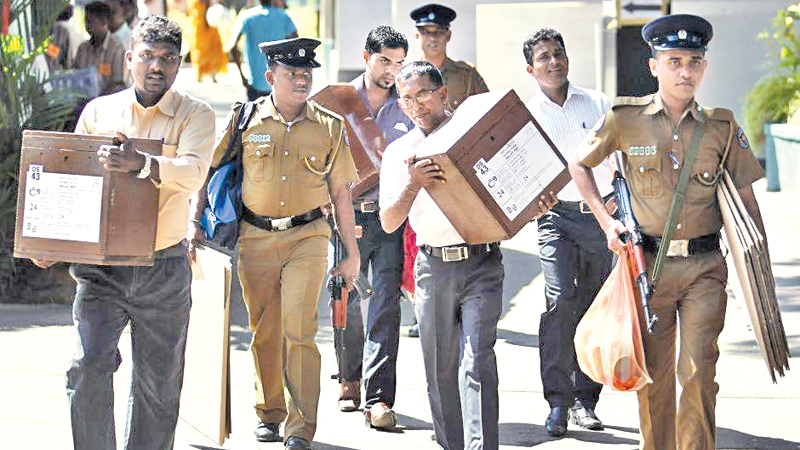The idea of Provincial Councils (PCs) is not a phenomenon new to Sri Lanka. Provincial councils were the outcome of Transfer of power to politically elected bodies under the concept of “Devolution”. It is an autonomous body deriving its power from the constitution and it is not subordinate to the central government or to parliament or inferior in status to them.
Provincial level is responsible for translating the national policies into provincial development plans. Established in February 1988 under the Provincial Councils Act No 42 of 1987 as a requirement to the 13th Amendment to the constitution it was a political move. Powers not given explicitly to the provincial councils are reserved to the centre governor.
Provincial councils were declared to be “colossal waste of funds” and created another bureaucratic layer adding more public expenditure, each provincial council had over 100 staff grade officers and over 500 clerical and technical staff, allegations of irregularities, fraud, misappropriation of funds.
Provincial development in Sri Lanka
Some of the large reservoirs over 25 acres come under the central government and small reservoirs come under the provincial councils have been neglected due to managerial problems and lack of funds. Directions enumerating the access to the heritage sites are invisible.
There are no directions shown to the public, researchers who come for frequent visits to heritage sites in Uva province. Some of the name boards have faded away and road network has destroyed. Minor work such as maintaining name boards in order to facilitate foreigners and local guests to visit heritage sites has been neglected.
In such a way provincial governance is not close to the hearts of the people in Sri Lanka.
Those institutions are operating with less beneficial to the public. It is my belief that once an individual or an organisation starts to think about its impact on society, it will almost automatically begin to improve processes to help others.
Corporate Social Responsibility
We cannot depend on the provincial councils or local governance always rather we need out of box thinking in Corporate Social Responsibility (CSR).
It is the most holistic way for companies or organisations to look at their social (and environmental) impact. But what a lot of companies think when they hear “CSR,” is that they can give back to society only once they have become very successful/profitable. However, CSR goes beyond that.
CSR is something that can be attained even as an organisation is growing.
It can start very close to home by addressing the employees of the organisation and then expanding their stakeholder circle to include second and third degree levels of influence.
Eventually the organisation will be run in a way that positively impacts all stakeholders and thus ticks all the CSR boxes.
The Citizen Report Card (CRC) initiative in Banglore (1993) is an excellent simple yet powerful tool to provide public agencies with systematic feedback from users of public services such as transport, health services, sewage disposal. By collecting feedback on the quality and adequacy of public services from actual users, CRC provides a rigorous basis and a proactive agenda for communities, civil society organisations and/or local governments to engage in a dialogue with service providers to improve the delivery of public services. This kind of a mechanism is essential in Sri Lanka to enhance the quality and adequacy of public service especially in case of provincial councils.
Focus on provincial development
Very little revenue is raised directly by provincial councils and heavily depends on the grant given by the central government. A platform need to be created in compilation of thought pieces from local and regional contributors from public, private and academic sectors, intended to contribute a voice that focuses on regional development. All depend on its people, their attitude towards a change in future development landscape. We need to share the respective wisdom of our local expertise on the challenges in leadership in provincial councils and local governance in order to develop for the betterment of the citizens.
Challenges always exist and require constant re-examination. At present there is a decline in volunteerism and charity giving, as a result of social volatility and economic uncertainties. In such a circumstances serving to the public is a challenge.
Creating social impact
At present everyone is talking about creating social impact. All the development activities need a significant, positive change that addresses a pressing social challenge. Many of the development programmes in Sri Lanka was not people oriented and hence continuation of such programmes are questionable. Since, ground realities were not emanated from people, outcome of the projects cannot be reached. There cannot be good governance in such a circumstances. Processes and institutions need to produce results that meet the needs of society while making the best use of resources at their disposal.
Last, but not finally, they should provide ethical service. This means that whatever provincial councils and local governance provide, they should be able to justify as useful in the sense of helping public to move towards their appropriate goals. There should be cost transparency to the public and a fair distribution of revenue. Further, as responsible citizens in Sri Lanka the most appropriate way is to be the best version of ourselves to everyone. This applies not only to individuals, but to all blocks and levels of society.



Add new comment